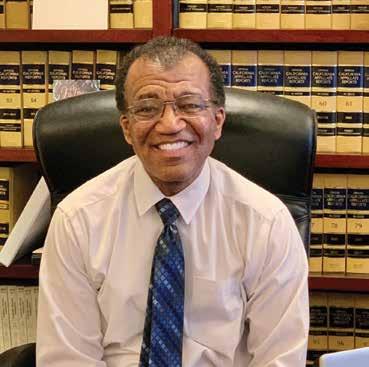
2 minute read
JUSTICE RICHARD T. FIELDS (LLM 2020
A BROADER PERSPECTIVE Justice Richard T. Fields gains important new skills from Gould’s Master of Laws in Alternative Dispute Resolution
Justice Richard T. Fields is one of the first sitting judges to enroll in USC Gould’s Master of Laws in Alternative Dispute Resolution program. By Sarah Hazan In 1991, the backlog of cases under appeal in Riverside, Calif., posed a crisis for the court system. With inadequate resources to continue prosecuting appeals, and a desire to resolve cases quickly, mediation was introduced as a compelling solution.
Advertisement
Justice Richard T. Fields of the Riverside County Superior Court, who presided for 26 years in the Riverside County courts prior to his appointment and subsequent confirmation to the Court of Appeal in 2017, recently joined the appellate court’s mediation program to help it develop and grow as a form of alternative dispute resolution in the unique appellate court setting.
“We hear criminal, juvenile, family law, wrongful death and partnership dissolution cases and more,” says Fields about the broad range of cases being mediated.
By resolving a case, rather than continuing through the court appeals process, “you’re going to leave knowing what you agreed to,” he says. “People leave with a certain peace of mind when they decide the resolution instead of the court deciding for you.”
A NEW SKILLSET — AND PERSPECTIVE Despite nearly 30 years on the bench, Fields says he knew he needed additional skills in dispute resolution to successfully participate in the mediation program. He became one of the first sitting judges to enroll in USC Gould’s Master of Laws in Alternative Dispute Resolution (LLM in ADR) degree. He balanced hearing cases all day in Riverside with traveling to USC’s Los Angeles campus for night classes, earning a degree he calls essential to a successful leadership role in the court’s mediation program.
“As a judge, you have certain skills that you apply in the courts and skills you’ve learned over the years in order to resolve cases. So much of what we do in the court system is because it’s the way it’s always been done,” says Fields. “But this time, I knew there were skills and techniques to learn first.” ENSURING EFFECTIVE OUTCOMES One of the first of its kind, the Division 2 of the 4th Appellate District’s mediation program now consists of 100% volunteer lawyers — 15 participating at a time — and has resolved approximately 1,500 cases since its inception. With roughly six mediations in the settlement rooms of the appellate court resolving each month, the court’s program is working. Not only are more cases closed, but more of the people involved feel heard and seen by the court system, agreeing to a fair and just resolution, even though one party had won a prior verdict.
Fields says he was surprised by how his LLM in ADR at USC Gould impacted his work. “Typically, the way[s] judges handle cases are strictly evaluative. Now, I think that I look at a case with a broader perspective.”










